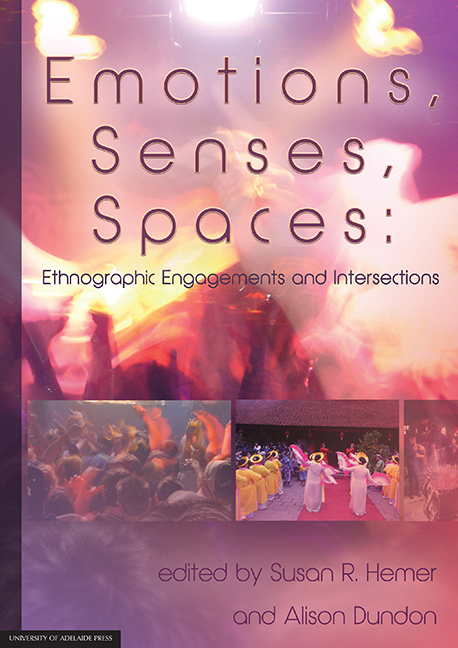Book contents
- Frontmatter
- Contents
- Biographies
- 1 Ethnographic intersections: Emotions, senses and spaces
- 2 ‘Dancing for joy’: Gender and relational spaces in Papua New Guinea
- 3 Creating the right ‘vibe’: Exploring the utilisation of space at Hip Hop concerts in Adelaide and Melbourne
- 4 Pontic dance: Feeling the absence of homeland
- 5 Emotional actors/Affective agents: Interspecies edgework and sociotechnical networks in the Spanish bullfight from horseback (rejoneo)
- 6 Sensual feasting: Transforming spaces and emotions in Lihir
- 7 Anxious spaces: The intersection of sexuality, the senses and emotion in fieldwork in Nepal
- 8 Interrupted research: Emotions, senses and social space in (and out of) the field
- 9 Voices in the park: The composition of sacred space and public place
- 10 Ngadha being-in-common: Emotional attachment to people and place in Flores, Indonesia
- 11 Trust your senses: Growing wine and making place in McLaren Vale
9 - Voices in the park: The composition of sacred space and public place
Published online by Cambridge University Press: 25 July 2017
- Frontmatter
- Contents
- Biographies
- 1 Ethnographic intersections: Emotions, senses and spaces
- 2 ‘Dancing for joy’: Gender and relational spaces in Papua New Guinea
- 3 Creating the right ‘vibe’: Exploring the utilisation of space at Hip Hop concerts in Adelaide and Melbourne
- 4 Pontic dance: Feeling the absence of homeland
- 5 Emotional actors/Affective agents: Interspecies edgework and sociotechnical networks in the Spanish bullfight from horseback (rejoneo)
- 6 Sensual feasting: Transforming spaces and emotions in Lihir
- 7 Anxious spaces: The intersection of sexuality, the senses and emotion in fieldwork in Nepal
- 8 Interrupted research: Emotions, senses and social space in (and out of) the field
- 9 Voices in the park: The composition of sacred space and public place
- 10 Ngadha being-in-common: Emotional attachment to people and place in Flores, Indonesia
- 11 Trust your senses: Growing wine and making place in McLaren Vale
Summary
Abstract
City parks and gardens are environments established to enhance, complement and offset the economic and residential conditions of urban living. Composed of life forms attributed to the ‘natural world’ for human pleasure and wellbeing, these ‘green spaces’ are socially inscribed with liminal potentialities. As ontological islands in geographic space, urban parks and gardens exist in, and generate tensions between, orderings of reality in modern societies. An Adelaide group of environmentalists and their friends meet regularly in the Adelaide Park Lands to practise Reiki spiritual healing. In their group healing sessions, they bring a cultural discourse of health and harmony associated with green and natural places to the social foreground in their use of spontaneous, ambient vocalisation. Drawing on understandings of healing energy derived from notions of ultimate truth as a universal, animated energy of love, the members of the Reiki group give voice to their spiritual experience of communal healing. As a feature of improvisation, the emotional spiritual tone of vocalisation is not a formal component of Reiki healing technique, and it challenges the social constraints of conduct in public place as rational space. This chapter explores how ambient vocal sound produced as spiritual emotion takes up conceptual gaps in social ambivalence about ‘natural’ and ‘unnatural’ space, composing public space as cosmic spiritual space.
Introduction
Just begin making a sound, then it becomes comfortable. Next, explore … the sound, directing it to the person; then become immersed, absorbed in the energy of the sound and there's no … space between oneself and the sound for … thought, a dissolving of barriers, preconceptions, self‑consciousness of whatever is between you and the other person. (Interview with Tom, 1 April 2011)
In the long, late summer grass, the Reiki healing session was now well underway. Tom lay flat and straight on his back with his eyes closed, surrounded by six others who were conveying healing energy to him from the palms of their hands, laying them softly on his shoulders, stomach, knees, ankles and feet. At irregular intervals, individuals lifted their hands, held them at a short distance from Tom's body, moved them backward and forward or in circular motions, or made broader sweeps of his body to ascertain where to apply healing next.
- Type
- Chapter
- Information
- Emotions, Senses, SpacesEthnographic Engagements and Intersections, pp. 137 - 158Publisher: The University of Adelaide PressPrint publication year: 2016



